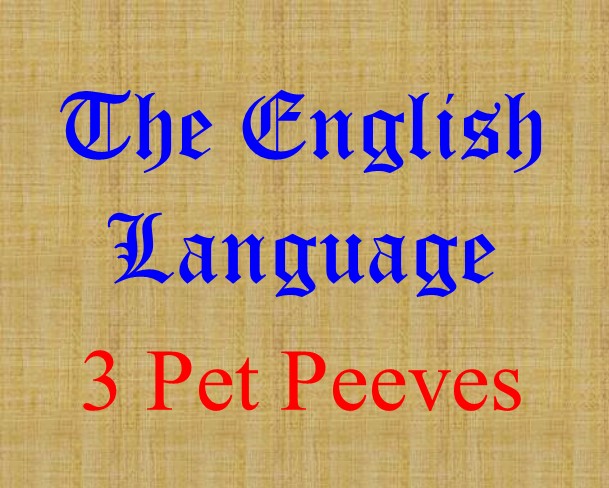What is the origin of these three English-language pet peeves? Could it be as a caregiver, I felt my time was not respected at the doctor’s office? Or are these due to English being my second language?
As a first-generation American, we, like many immigrant families, spoke my parents’ native language. In my case, it was Armenian and I was initially challenged to decipher which were the English words to use in a mono-lingual tolerant school. I later learned to speak Spanish (especially after I’ve had some tequila). I even spoke a bit of Mandarin Chinese and Japanese. (I confess, no amount of Tsingtao beer or sake will help me with these last two.)
Research has shown, those who speak more than one language are able to perceive a greater variety of things than those limited by one language.
 My husband won’t agree with this “variety” claim. He believes I take things too literally. I am perplexed by his explanation, “They’re just saying that.” I can’t read minds! How will I know when ‘you’re just saying that’ versus when I should believe you?
My husband won’t agree with this “variety” claim. He believes I take things too literally. I am perplexed by his explanation, “They’re just saying that.” I can’t read minds! How will I know when ‘you’re just saying that’ versus when I should believe you?
We owe it to one another to use our tools responsibly. Language is a tool.
Instead, many of us get a lot of unnecessary exercise jumping to conclusions about what is really meant by the words we’re hearing.
1. At the Doctor’s Office
“The doctor will see you, shortly.”
Shortly?
After waiting 5 – 10 minutes, which is relatively short, I’ve also waited 90 minutes at a neurologist’s office.
Today, I ask, “What do you mean by shortly?”
Most receptionists act annoyed at having to answer this. After all, how do they know if the doctor is called on an emergency? In the rare instances when this happens, the nurse should notify the receptionist. The receptionist should immediately inform the waiting patients who by then are losing patience. This is an act of simple courtesy and respect for everyone’s time.
2. On the Podium
How often have you heard a speaker who is giving an award, thanking or introducing someone, say, “I would like to… ” (Truth is, I also used this language at the lectern and in the Acknowledgements section of my earlier books! When I became aware, I stopped.)
Every time I hear this, I think, “Well, get on with it!” Or to borrow the trademarked Nike slogan: Just Do It!
How much more powerful will our language and meaning be when we get on with what we intend to say?
“Thank you, [name of group or person] for….”
If jumping in takes some getting used to, then add some lead-in words. Start by explaining the person’s contributions and the positive effect they’ve had on you/your organization. “Because of [this person’s/group’s] actions, which include [whatever they did], we can now [the resulting impact of their actions]. Thank you, very much.”
If you’re introducing a speaker, begin with some introductory remarks about the speaker and then introduce him/her by name.
3. At a Restaurant
You pay your attentive server compliment. “Thank you so much for your attention to detail and your meal suggestions.”
The server replies, “No problem.”
I don’t know about you, but when I express my appreciation to someone, I feel uplifted as I see a smile on their face. When someone responds in the negative (beginning with “No”) as in “No problem” my spirit sinks. I’m left wallowing in how a person could take an uplifting compliment and weigh it down with the word “problem?” Then I begin wondering: Is this a one-time event? Will the server offer this level of service, again? If I ask next time, will it be a problem?
I’ve considered why so many people say this. It’s not just those who speak Spanish, who reply with “de nada,” meaning, “it’s nothing.” The spirit of this saying derives from a cultural kind response that your request was not an imposition, “Don’t mention it.” How it pervaded our vernacular as a loose-fitting “you’re welcome,” is beyond me.
This is my major language pet peeve. If I care enough or have the time and energy, I’ll suggest an alternate response that lifts the spirit of both parties in the conversation.
Instead of a weighty reply, respond with “My pleasure” or “El gusto es mio.” (The pleasure is mine.)
How did that make you feel? It’s an uplifting pleasing statement assuring the listener that s/he can expect this level of service from you in the future. It makes me smile as I write about it, here.
Join me in building relationships by being aware of the language we use. For more, click to read The Power of Positive Language, which explores the bipolar nature of the English language and offers five tips to overcome negativity in our speech.









mmm literal lady — no wonder you ‘enjoyed’ the Aussie idioms spoken dementia shortened staccato when we spoke by zoom — My pleasure — for sure Val xoxo